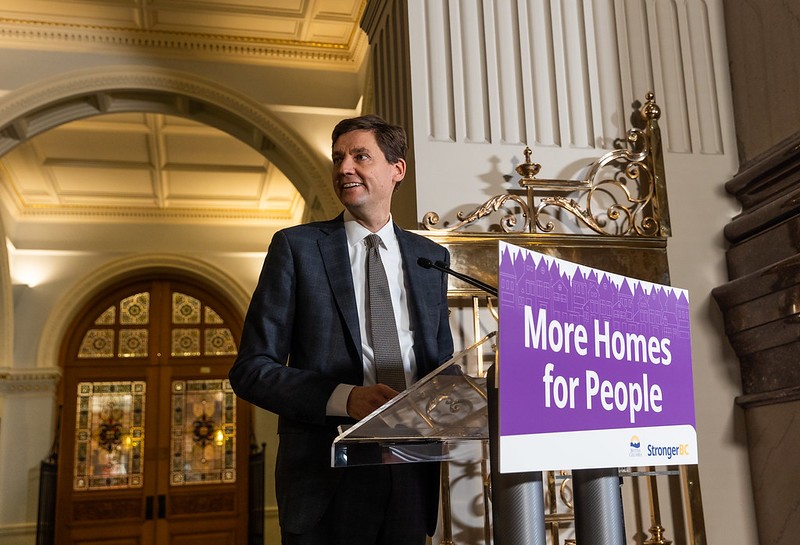B.C. proposes major changes to address housing crisis
The changes come from the province’s newly-sworn in premier.

B.C. Premier David Eby announces his plan to address the province’s housing crisis. – Province of B.C.
Key Takeaways:
- The changes include empowering the province to set housing targets in key municipalities and changing strata rules to allow more renting.
- The new housing targets could come into effect next year while the strata changes would go into effect immediately.
- The province is also forming a standalone ministry to address housing issues.
The Whole Story:
B.C.’s new premier is looking to introduce law changes and establish a standalone ministry to address housing supply and affordability.
“B.C.’s housing crisis is stressing out and hurting people while it holds back our economy,” said Premier David Eby. “As a first step in my 100-day plan, we are making changes to deliver more homes for British Columbians, faster.”
Speeding up approvals
The first piece of legislation, the housing supply act, aims to help speed up housing development and increase supply by giving the province the power to set housing targets in municipalities with the greatest need and highest projected growth. Eby says targets will be based on information provided by and in consultation with municipalities. The new housing targets will encourage municipalities to address local barriers to construction so that housing can get built faster, including updating zoning bylaws and streamlining local development approval processes.
A recent study commissioned by the Canadian Homebuilders Association of B.C. recently analyzed 650 individual approvals from13 municipalities. The data showed that it takes on average 13-14 months to approve rezoning and development permits and over 20 months for a subdivision application.
The province plans to monitor progress and work with municipalities to help address barriers to meeting housing targets and to support the increased community needs associated with targeted growth. The act enables compliance options as a last resort, should municipalities with the highest need struggle to create the conditions that are necessary to ensure housing gets built.
If passed, the housing supply act is scheduled to be brought into force in mid-2023. To support implementation, the province will continue to help local governments speed up local approval processes through the continued implementation of the Development Approvals Process Review and work underway to accelerate provincial approvals.
Amending Strata laws
In addition, the province is making amendments to the Strata Property Act to end all strata rental-restriction bylaws and to limit age-restriction bylaws so that the only permitted age restriction is to preserve and promote seniors’ housing through the “55 and over” rule in strata housing. Some buildings have “19+ only” age restrictions that mean couples starting a family have to plan to move out as soon as they become pregnant. Stratas will be able to appear at the Residential Tenancy Branch to evict problem tenants and recover costs of those appearances.
“There’s a lot of things on your mind when you are getting ready to start a family. It can be a very stressful time,” said Sarah Arnold, an expectant mother and condo owner in Victoria. “The last thing you need to think about when you’re preparing to welcome a newborn is finding a new place to live. These unjust age restrictions have hurt a lot of families, and I am pleased to see the Province is taking action to make sure no more couples have to uproot their lives and leave their homes if they decide to start a family.”
In areas where government has data through the Speculation and Vacancy Tax, there are approximately 2,900 empty condos that cannot be rented out because strata rules prevent them from renting out their condo, and government expects there are more empty units in strata buildings in other parts of the province. This amendment will enable owners to rent out these badly needed homes immediately. Government also expects that some owners in strata buildings would choose to rent out a room in their condo if they were given the opportunity to do so.
“Rules that prevent families with children from living in a home or prevent people from renting the unit they own are no longer acceptable in our current housing market,” said Murray Rankin, Attorney General and Minister Responsible for Housing. “These amendments will open up more rental and homeownership options for people at a time when they’re needed the most.”
If approved, the changes to the Strata Property Act would take effect immediately. Bylaws restricting short-term rentals, such as AirBnBs, will continue to be allowed.
New ministry for housing
Eby also announced a new housing ministry as part of his plan to address the province’s housing crisis.
“For too many British Columbians, owning or even renting a good home feels out of reach,” Eby said. “The housing crisis deserves the attention of a full ministry and the resources that come with it. As premier, I am committed to making meaningful progress to make sure everyone in B.C. can afford a good home.”
Premier Eby made the announcement on Tuesday, Nov. 22 during a speech to about 1,400 attendees at the Housing Central Conference at the Sheraton Wall Centre Hotel in Vancouver. The annual conference on affordable housing is held by the BC Non-Profit Housing Association, the Aboriginal Housing Management Association, and the Co-operative Housing Federation of BC.
The minister of housing will be named when Premier Eby announces his cabinet on Dec. 7.
Before being sworn in as premier, Eby was the attorney general and the minister responsible for housing. The current minister responsible for housing is Murray Rankin, MLA of Oak Bay-Gordon Head.

